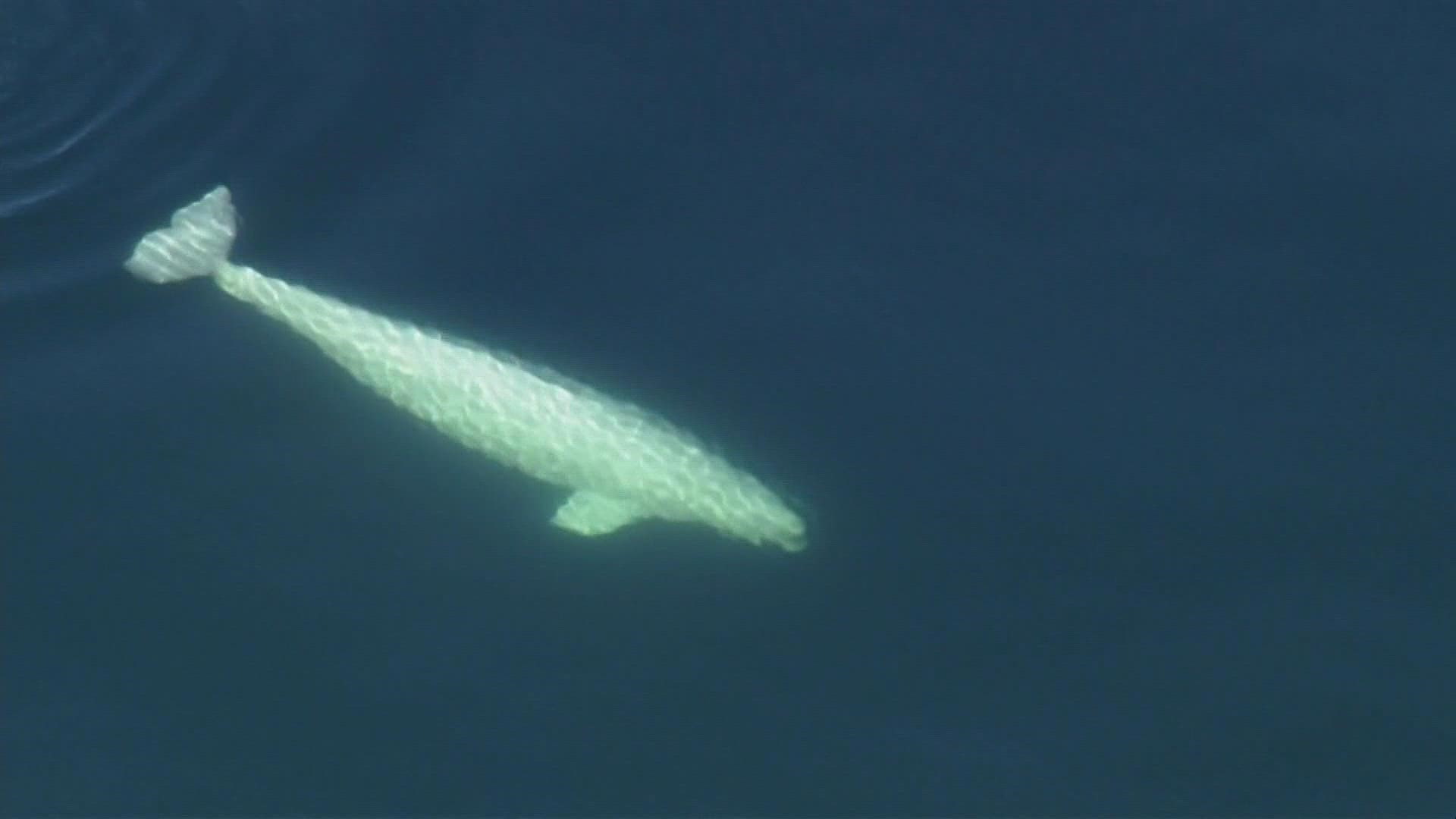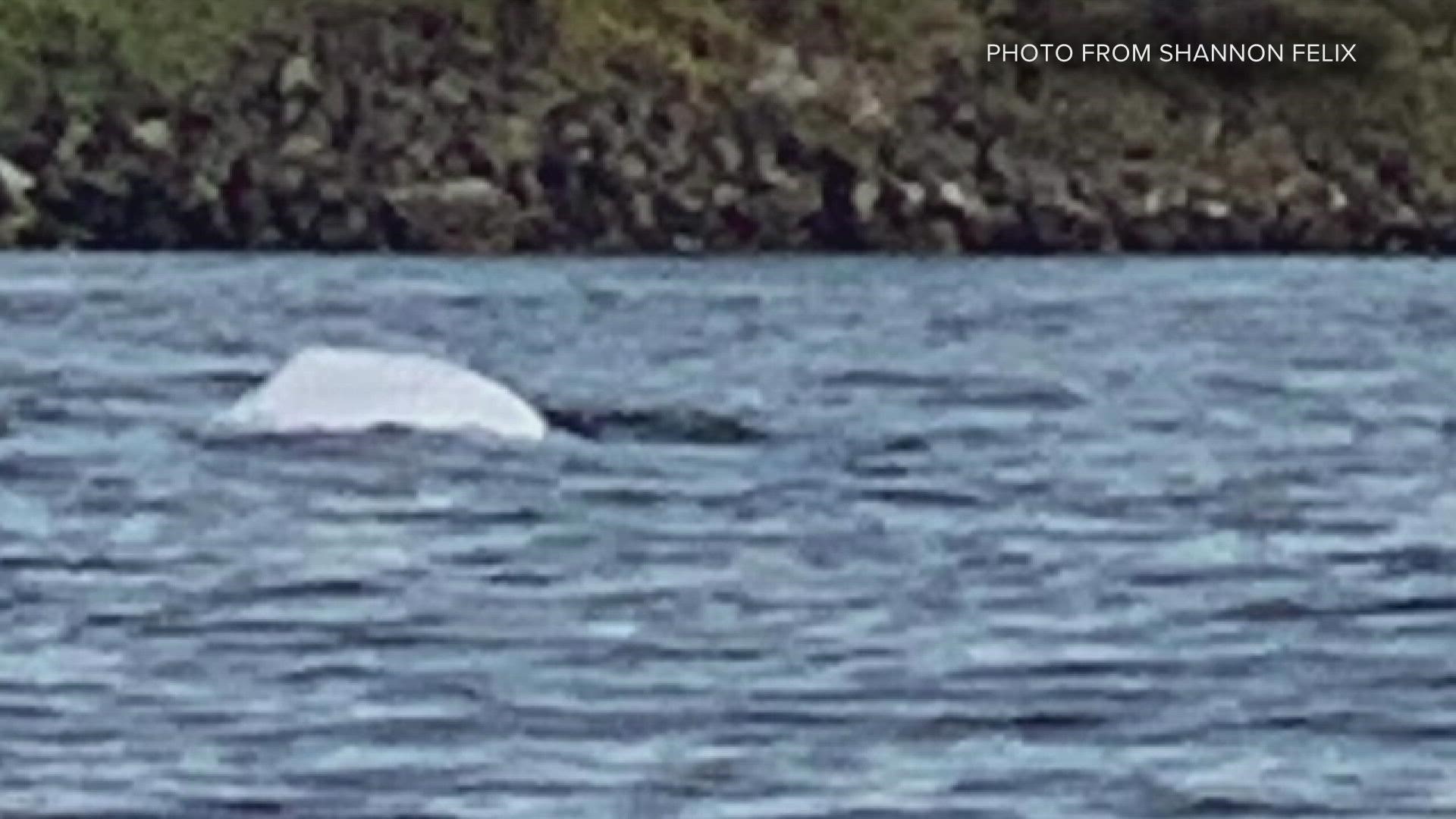SEATTLE — A beluga whale was seen in Puget Sound near Commencement Bay Thursday afternoon. It's the third time the beluga whale has been spotted in the region this week.
Barbara Mahoney, a biologist with the National Oceanic and Atmospheric Association (NOAA), said the agency is working to identify the whale and its origin and assess its health.
Upon studying the Sky KING footage, Mahoney said the whale is an adult but it's unclear yet if it's female or male.
Based on initial observation, Mahoney said the beluga does not appear to be injured and is swimming in a healthy manner. She and her colleagues wonder if it traveled from as far away as the Cook Inlet, near Anchorage, which is more than 1,000 miles north of Puget Sound.
"We have over 400 belugas identified in Cook Inlet from photographs so we can do a match from your whale in Seattle, to the whales in Cook Inlet we can identify that it is from Cook Inlet," Mahoney said.
Mahoney also does not know for certain how and why the beluga made it so far from home.
"It's a mystery for me, it's a mystery for a number of people. We don't have a first root of cause why," she said.
For now, NOAA teams will monitor the whale's behavior and movement. It is not clear whether it will be transported back to his natural habitat, though nothing is off the table, according to Mahoney.
Two sightings of the beluga whale were reported in central Puget Sound earlier this week, according to the NOAA.
They were reported to NOAA Fisheries, with one coming from Commencement Bay around noon on Sunday and the other coming near Elliott Bay on Monday.
Sunday’s sighting was captured on video, which was reviewed and confirmed by NOAA Fisheries experts.
If you spot the beluga whale or have another whale sighting, call the NOAA Fisheries West Coast Marine Mammal Stranding Network at 1-866-767-6114 or Orca Network at 866-672-2638.
The visiting creature is far beyond the typical range for beluga whales, which typically stay near Alaska and throughout the Arctic, according to a statement from NOAA.
“On rare occasions, we have documented similar ‘wayward beluga whales’ on the west coast and east coasts of the [U.S.] - most recently near San Diego, CA, in June 2020,” the statement reads in part.
NOAA could not confirm the origin of the whale as it is still reviewing the sighting reports and photographs. Its current location is also still unknown, but NOAA said it will monitor the whale’s health while it's in the area.
Paul Wade, who researches beluga whales for NOAA's Alaska Fisheries Science Center, said there are many reasons whales have ventured beyond their natural habitats in the past.
"What we know from other whales that are found off in their range, oftentimes they may be sick, they may be undernourished and looking for food and sort of going to crazy places to find food because they're so desperate," Wade said.
Wade also wondered whether algae blooms from a recent heatwave in Alaska may have played a role. Certain algae contain domoic acid, which can be toxic when ingested.
"Domoic acid has been shown to mess up the part of the brain that has to do with navigation," Wade said.
Jason Rogers, of Bonney Lake, was sailing on Commencement Bay near Tacoma Sunday afternoon when he spotted a white object.
"My first thought is, it was an orca that was actually upside down from the bottom side of it. that was quickly ruled out. Then it became, I think we're looking at a beluga here," Rogers said.
His wife took video of the sighting, which shows the beluga surfacing for a moment before dipping back underwater.
"In that instant, we knew we were watching something that was truly a once in a lifetime experience," Rogers said.
Shannon Felix of West Seattle also saw the beluga in Elliott Bay as she was kayaking off Jack Block Park.
"We were completely baffled and it wasn't until we got home and were able to Google it and realized oh yeah that probably was a beluga whale," Felix said.
While thrilling to see, Wade of NOAA said it is unlikely the beluga will be able to survive so far from its habitat.
"Occasionally healthy whales to kind of go exploring to try and find a new habitat but most of the time it's not a good situation and we often find those whales dead later on," Wade said.
The only previously documented sighting of a beluga whale in Puget Sound came in 1940 near Point Defiance.
The beluga whale is protected by the Marine Mammal Protection Act. Whales from the Cook Inlet population in Alaska are listed as “endangered” and one of NOAA Fisheries’ “Species in the Spotlight.”


